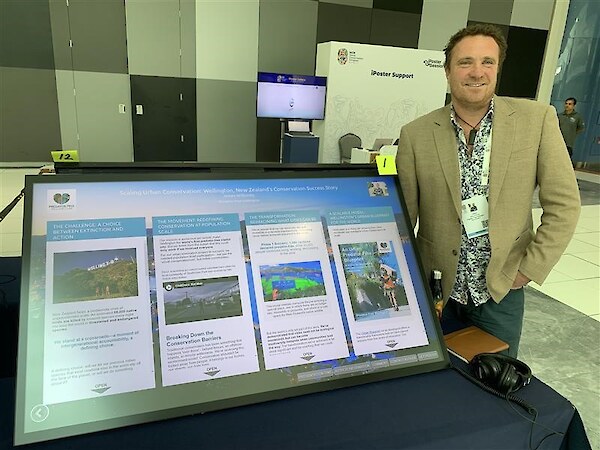The time is now: Reflections from the IUCN World Conservation Congress in Abu Dhabi
By James Willcocks, Predator Free Wellington, Project Director
It was a huge privilege – and a little surreal for the boy from Rotorua – to represent Predator Free Wellington at the IUCN World Conservation Congress in Abu Dhabi.
Picture it: nearly 10,000 people from 122 countries, filling massive halls, all united by one purpose. Every four years, the global conservation community comes together like this, and this time, I got to be part of it.
One of my first lessons came from a simple translation mix-up. When we talked about being “predator free,” many international colleagues were genuinely concerned – they’re working hard to protect their predators like lions, tigers, and wolves. The idea of removing predators seemed completely wrong to them. But in New Zealand’s context, we’re talking about eliminating invasive mammalian predators that threaten our native species. Globally, that’s known as invasive alien species management, and is recognised as one of the biggest threats to biodiversity worldwide, second only to human-induced land change.
Explaining that we’re one of the few countries without native land mammals (apart from bats and marine mammals) changed everything. Once people understood that unique context, the response was incredible. They saw what we’re doing as ambitious and deeply hopeful.
The Congress had three themes that really aligned with our work: scaling up resilient conservation, moving towards nature-positive economies and societies, and embedding equity. The idea that challenged me most was scaling deep.
We often talk about scaling up – replicating and expanding what works. Scaling deep is different. It’s about shifting systems for long-term change: putting people at the centre, thinking long-term instead of fast, learning by doing, and collaborating rather than competing. One speaker summed it up perfectly: too often, we “pilot and pray” instead of designing deliberately for lasting impact.
Another big takeaway for me was about equity – not as an add-on, but as the foundation. Human-centred conservation means asking who benefits, who’s excluded, and how we shift power so this work carries on beyond us. It aligns closely with te ao Māori, reminding us that everything’s connected.
There was also a lot to learn from cities building for nature. Singapore’s Urban Biodiversity Index helps cities track and report biodiversity gains globally. In North America and the UAE, bird-safe building guidelines require developers to plan for things like glass collisions. Abu Dhabi’s dark sky policy tackles light pollution and celebrates cultural identity. These are practical ideas we can adapt here to make cities places where people and nature thrive together.
So where does this leave Predator Free Wellington on the global stage? Right up there. What we’re doing is seen as world-leading – human-centred conservation in action. We’re learning about scaling deep and putting equity at the core. And we’re also learning from others: how to embed conservation in everyday policy, design, and decision-making.
Dr Jane Goodall had been due to attend the Congress, but following her recent passing, there was a moment to honour her extraordinary legacy. She spent her life carrying a message of hope – that it’s not too late, and that every action matters. That same determination was alive in those rooms in Abu Dhabi. The sense that, despite the scale of the challenge, we can – and must – crack on.
That’s what we’re doing here in Wellington. The wellbeing of people and the wellbeing of nature really are inseparable.
The time is now. We’re getting on with it. And we’re not doing it alone.
Posted: 22 October 2025
